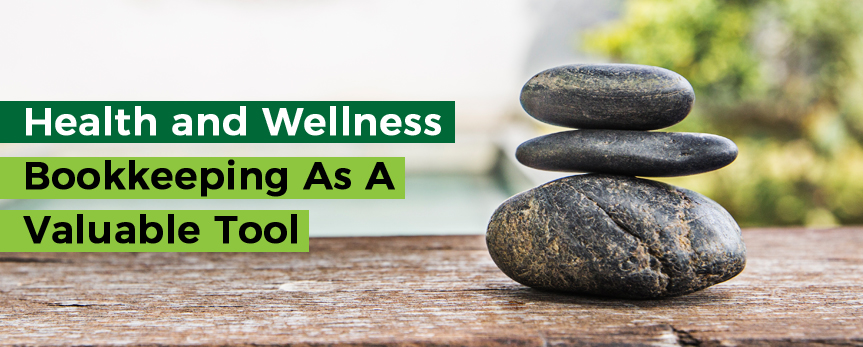
As a health and wellness business owner, does the word “bookkeeping” make you cringe? Let me guess: You are nodding your head “Yes.” Believe me, I get it. You didn’t get into this business because you wanted to do accounting, right? The thought of looking at reports is nauseating, I’m sure.
I have one of the hardest jobs in the world: to excite business owners about bookkeeping.
However, if you will give me just a few minutes of your time, I am sure I can prove to you that not only is bookkeeping valuable to your health and wellness business but possibly one of the most underutilized tools in your arsenal.
UPDATE THE BOOKS
One of the reasons you are failing to find value in your financial reports is because you don’t have a good system to update your bookkeeping. If your books are months behind, you won’t see any value in your bookkeeping. In fact, your bookkeeping will only stress you out.
In a New York Times article titled, “Top 10 Reasons Small Businesses Fail,” you will notice that many of them are related to bookkeeping. Particularly numbers four and five on the list: poor accounting and lack of a cash cushion. Not managing cash flow is one of the major reasons that I feel many small businesses fail, regardless of the industry they are in.
The first step in finding value in your health and wellness bookkeeping is to come up with a system to update it consistently.
WORK ON GROWING YOUR BUSINESS, NOT RUNNING IT

Go back to that New York Times article and read number two out loud to yourself. “Owners who cannot get out of their own way.” Honestly, I could not have said that any better.
Great business owners hire outstanding talent and develop them to do the job better than they themselves could do it. Bad business owners hire people and then micromanage them and end up trying to do everything themselves because they feel nobody can do it better than they can.
If you want to spend the rest of your life working in the day-to-day of your business, stop right now. You should quit! If that is your mentality, you want a job, not a business.
Get out of your own way in your business and start working on growing it, not doing every little task.
IDENTIFY AND MONITOR YOUR KEY METRICS
Before you even think about key metrics to monitor, you will need a way to track and report on them. Even in a very small business, I would recommend some sort of point-of-sale system and customer relationship management (CRM) software. In the health and wellness space, I highly recommend the use of Mindbody. This easy-to-use online POS system helps you analyze financials and also acts as your CRM. In addition to Mindbody, I would also recommend a good piece of accounting software like QuickBooks online.
The next thing you want to do is figure out a couple of key metrics that you feel are important to monitor and set up a system to track and report on them. Below are just a few suggestions; this is not a complete list by any means:
1. COST OF GOODS
You certainly want to monitor costs like retail, merchant fees, and especially teacher pay. Since what you pay teachers is one of the key items to monitor, you need to develop a pay structure that makes sense from a profitability standpoint, but that also incentivizes teachers. Some common methods I have seen are a flat fee (not recommended), percent of total sales of each class taught, and base + per student incentive beyond a certain number of students.
2. RENT AND UTILITIES
These can certainly be a large expense on the profit and loss that you need to set a budget for and be sure to monitor.
3. MARKETING AND ADVERTISING
This is another expense line item that I would carefully monitor. I’m often asked what an appropriate amount is to spend on advertising, which is a difficult question to answer. It really depends upon your skillset in marketing. You can certainly have a big marketing impact through social media and inbound marketing efforts, but that requires time and expertise. While it is difficult to put a percentage you should be spending on marketing, I would say that on average, a small business spends between 5% and 8% of gross revenue.
FORECAST THE FUTURE

One thing I try to impress upon clients is that the only thing that really matters is where they are going. While it is important to look at past financial performance, it is crucial to look at a financial forecast of where you are going.
Who cares what happened last month or last quarter? In all honesty, you are probably getting the financial information too late to do anything about it anyway. We aim for real-time data when it comes to our clients’ bookkeeping. At the end of each month we want you to know exactly where you are at, but also where you are going.
Forecasts are a great way to take a look at where you are going so that you can spot potential threats, as well as opportunities. Forecasts are also a great tool to help you manage cash flow.
SALES ARE BY FAR THE MOST IMPORTANT THING
When it really comes down to small business success, the only thing that really matters are sales. I don’t know how many times I have referenced Mark Cuban’s post titled “A Couple of My Rules for Startups,” but #4 is the most important of all. Cuban says, “Sales Cures All. Know how your company will make money and how you will actually make sales.”
Not matter what is going on in your business, your industry, or your environment, the only thing you need to constantly figure out is how to create sales. If you can’t make sales, you are dead… period.
Is the bookkeeping for your health and wellness business a growth tool or a hindrance?
AUTHOR: MATT ROBERGE

ABOUT THE AUTHOR
Nicolay H. Kreidler is an entrepreneur and strategic consultant in the health and wellness space who focuses on turning around distressed businesses and re-positioning them for success.

